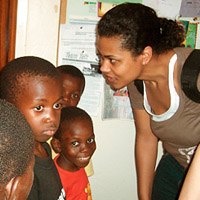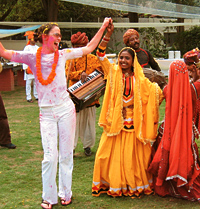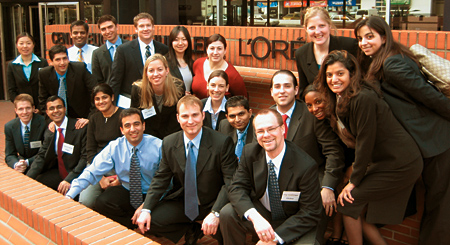| Bumpy
takeoff didn't ground innovative GIM course A
popular Kellogg offering had to go to great lengths to prove
itself, but its legacy remains secure after nearly two decades
By
Rebecca Lindell
If
the Kellogg School is the place where students make things
happen, the Global
Initiatives in Management program is surely Exhibit A.
| |
|
| |
|
| |
 |
| |
Africa,
through a child's eyes. Bethany Pinnick '07, interacts
with orphans at the Ebenezer Child Care Trust in Livingstone,
Zambia. There, GIM students sang and danced with the children
and presented a donation to the facility, which accommodates
children affected by HIV/AIDS. A focus of the Kellogg
visit to Southern Africa included HIV education. |
| |
|
| |
 |
| |
Kim
Hickey '07 takes part in the celebration of Holi during
the GIM India trip. Students learned about Indian cultural
traditions and examined opportunities and challenges for
foreign investment in the country. |
| |
|
| |
 |
| |
A
new era for China: Atop a staircase along a portion of
the Great Wall of China, GIM students experience the country's
landscape. The group also studied the blogging phenomenon
and the relation of emerging technology to increased profit
for companies there. |
| |
|
Now
in its 17th year, GIM allows students to custom-design an
academic excursion to a foreign country or region. While faculty
advisers — including Professor Mark
Finn, the program director — provide guidance, students
handle key aspects of the course, from lining up speakers
for 10 weeks of Evanston-based classes to coordinating travel
arrangements for the two-week-long trip.
Kellogg
aficionados frequently cite GIM as an example of the power
students have to shape their academic experience at the school.
This year, more than 300 full-time students traveled to eight
countries, exploring business topics of their own choosing
and building networks of contacts. Students in the Executive
MBA Program and The
Managers' Program also planned and conducted their own
GIM trips.
GIM is now
as much a part of the Kellogg brand as is the school's reputation
for nurturing team leaders. But in 1989, when Samuel "Sandy"
Haviland '90 first approached Kellogg administrators with
his idea for a group study trip to the Soviet Union, he wasn't
sure the notion would ever get off the ground.
Haviland's
initial proposal — which he concedes needed more refinement
— was met with reservations by the administration.
"I
think anyone who is easily dissuaded would have quit at that
point," says Haviland, now president of Haviland &
Co., a financial services firm in Connecticut.
Dean
Emeritus Donald
P. Jacobs had his own concerns. "Sandy came into
my office and said, 'The Berlin Wall has come down and there's
all this happening in Eastern Europe and we want to be a part
of it,'" Jacobs recalls.
"He
wanted a student-driven, student-organized trip. We said,
'OK, but there ought to be some faculty who go along with
you.' We were also worried about the volatility in Russia
at the time, and we wanted to be able to guarantee the students'
safety."
Undaunted,
Haviland rethought the proposal. He looked to several senior
faculty members for help in repackaging and selling the idea.
The
experience turned into an object lesson in tenacity —
not to mention marketing and organization behavior.
|
| "The
JD-MBA program is nothing short of amazing, with
its tremendous flexibility that allows students
to tailor our academic experience to meet our intellectual
and career goals. The Kellogg administration enabled
me to schedule time to be a member of a law journal
and the law school's transactional legal clinic
student board."
Lartease Tiffith '07 |
|
|
| |
|
|
| Flashback
1999
"The student government worked closely with
Professor Jain (before he was dean) to implement
the Code of Ethics which complemented the already
strong ethics-driven culture. We also worked with
multiple constituencies — teachers, students,
administrators — to implement a new, improved
course-bidding system. The relationship between
students and the administration is close and collaborative,
which is synonymous with the Kellogg culture and
enables the school's initiatives and programs to
be closely aligned with student needs." William Kircher '99, Graduate Management
Association president |
|
|
| |
|
"Frankly,
we had not done enough homework about how the dean's office
thinks and operates," Haviland says now. "It was naïve
to be stunned that they would at first say no. But the students
we had talked to were too enthusiastic about the idea to quit."
Haviland's
first step was to gain the support of several key faculty
members, including Professor Walter
D. Scott, who eventually became the faculty adviser for
the trip.
With
Scott's help, he set about creating a formal, written proposal
that emphasized the academic nature of the expedition. In
addition, he and student government president-elect Dennis
Valdes '90 formed the core of a team to perform the legwork
necessary to launch the program, removing the main administrative
burden from the faculty.
Finally,
Haviland vowed that the group would "take the time to
get it right," promising to address any concerns before
repeating the experience the following year.
Satisfied,
Jacobs signed off on the plan, and a group of students traveled
to Moscow and St. Petersburg over spring break.
The
trip succeeded beyond even Haviland's expectations. The group
met "all the corporate people we'd set out to meet,"
Haviland says, as well as high-profile entrepreneurs and members
of the Soviet government.
In
an unexpected coup, the former chairman of the U.S. Joint
Chiefs of Staff, Admiral William Crowe Jr., was a passenger
on the return flight home and freely shared his insights with
the Kellogg group.
"It
was clear we'd achieved everything we'd hoped to achieve on
the trip," Haviland says.
Almost
immediately upon their return, the group began working with
the Kellogg curriculum committee to develop Haviland's idea
into a fully accredited course.
Sixteen
years later, literally thousands of Kellogg students have
experienced the same thrill of discovery that Haviland and
his team enjoyed during that Muscovite spring in 1990.
"The
funny thing is, we started this without any grand vision,"
Haviland says. "Our goal was just to get a first-hand
look at this really exciting part of the world. We never imagined
that the idea would be built and refined over time to become
the pervasive program it is today. We're certainly proud to
see that it's become such an important part of the school."
 |
| The
GIM European Union class visits L'Oreal's Centre Eugene
Schuler in Paris for presentations on the development
of its active cosmetics division and the launch of a new
Lancôme perfume. |
|



